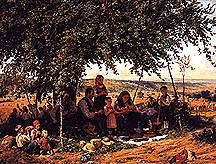
Beginning with the songs of shepherds in ancient Greece, the genre of pastoral literature evolved side by side with Western civilization, often idealizing the "simple life" as a contrast to sophisticated urban life, which was generally perceived as decadent. Related to this genre, but not bound by its conventions, are narratives about, and sometimes by, peasants, farmers, and other country folk who experience nature at first hand as they carry on an existence frequently characterized by unremitting physical labor, material deprivation or scarcity, and geographical limitation. In this course we will examine a wide selection of such narratives, both fiction and non-fiction, to discover the thematic and stylistic constants in portrayals of rural life, and to determine what values inform these narratives. Some attention will be given to the "blood and soil literature" of the Nazis.
COURSE FORMAT: Discussion Lecture
Level: UG Credit: 1.00 Gen Ed Area & Dept: HA GERM
Prerequisites: None
Last Updated on MAR-03-1998
Copyright Wesleyan University, Middletown, Connecticut, 06459